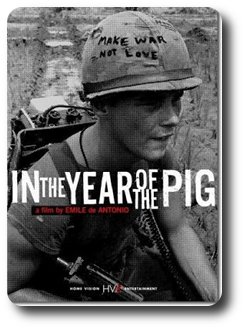Friday 6 November, 1.45pm until 3.15pm, Sheffield
 Venue: Sheffield Doc/Fest, Site Gallery, 1 Brown Street, Sheffield, S1 2BX
Venue: Sheffield Doc/Fest, Site Gallery, 1 Brown Street, Sheffield, S1 2BX
Tickets: Entry to this session and all other festival sessions requires a delegate pass. For further information go to: http://www.sheffdocfest.com
Many documentary makers are driven by a desire not only to document the world but to change it. So with the usual sources of funding drying up amid the recession, surely the opportunity to meet up with ‘social change film financiers’ is too good to miss? This is the idea behind radical new initiatives The Good Pitch, and Channel 4 Britdoc’s goodfilm.org. Campaigning NGOs and foundations as diverse as Greenpeace, Amnesty International, Friends of the Earth, the NSPCC, Save the Children, the Soil Association and the Joseph Rowntree Reform Trust are now active funders of new documentary.
But do these new funding models compromise editorial independence? Nick Fraser, editor of the BBC’s Storyville strand, has suggested there are ‘big dangers’ that NGOs could edge out impartial journalism with propaganda, however benign. NGOs may well be trusted by audiences, but shouldn’t documentary makers be as sceptical of these funders as they would be of any other multi-national corporations looking to promote their interests through film?
When filmmakers are encouraged to promise ‘associated outreach campaigns’ to maximise the impact of their film and its message on behalf of social action funders, what distinguishes documentary film-making from mere political advertising? When goodfilm.org suggests ‘best practice’ means working on social-purpose films in order: ‘To try and change law and influence policy; To question the status quo; To care more about the world around them’, should we be inspired, or suspicious about new forms of audience manipulation? No-one would deny NGOs the right to make films, or indeed that documentary can be a powerful tool for social change, but what are the pitfalls of these new instrumental social action funding partnerships and the new passion for campaigning on film?
 | Ceri Dingle director, WORLDwrite & WORLDbytes |
 | Nick Fraser commissioning editor, Storyville, BBC; series editor, Why Democracy?; executive producer, Why Poverty?; author, Why Documentaries Matter |
 | Jess Search chief executive, Channel 4 BRITDOC Foundation; co-founder, Shooting People |
 | Kevin Toolis director and co-founder, manyriversfilm; director, Emmy-nominated Cult of the Suicide Bomber |
| Chair: | |

|
Claire Fox
director, Academy of Ideas; panellist, BBC Radio 4's Moral Maze; author, I Find That Offensive |
In 2009, we have partnered with the Sundance Institute Documentary Film Program to take the Good Pitch, our 'Dragon's Den' pitching forum for social-justice documentary films, on tour in North America and the UK.
Channel 4 BRITDOC Foundation, 2009Hollywood actor Ted Danson has called on London's restaurants and supermarkets to offer sustainable fish to customers.
Mark Prigg, London Evening Standard, 3 November 2009The director's documentary
Scott Collins, LA Times, 2 November 2009Being in the right place at the right time helped Barack Obama go from obscure state senator to president in less than five years. And it helped two newbie film directors get themselves positioned to chronicle his remarkable ascent -- resulting in a behind-the-scenes campaign documentary now getting a splashy launch from HBO.
The Reliable Source, Washington Post, 2 November 2009After premiering The Cove, Broome severs ties with its sister city, Taiji, sparking an international controversy that may end dolphin hunting in Japan.
Karl Burkart, Mother Nature Network, 1 September 2009The Supreme Court will cut short its summer break in early September to hear a new argument in a momentous case that could transform the way political campaigns are conducted.
Adam Liptak, New York Times, 30 August 2009 The fishy message of The End of the Line
The fishy message of The End of the Line
Instead of guilt-tripping Western consumers about overfishing, we should invest our energy in developing aquaculture.
Rob Lyons, spiked, 9 June 2009 Stupid, feckless, greedy: that’s you, that is
Stupid, feckless, greedy: that’s you, that is
spiked reports from the premiere of The Age of Stupid, a cretinous film that unwittingly exposes the elitism and dodgy science of the green lobby.
Brendan O'Neill, spiked, 16 March 2009As a lover of documentaries and films generally, I believe the answer to the question can films change the world is unequivocally ‘no’.
Alan Millar, Battles in Print, 27 October 2007As The Times BFI London Film Festival kicks off this weekend, here’s some advice to the gathered movie stars: nice to see you, but please shut up.
Nathalie Rothschild, The Times, 17 October 2007Documentaries: Charities should be leading the way
Paul Hoggart, Guardian, 2 July 2007An articulate documentary causes Wendy Ide to think twice when ordering her morning caffeine hit.
Wendy Ide, The Times, 7 June 2007